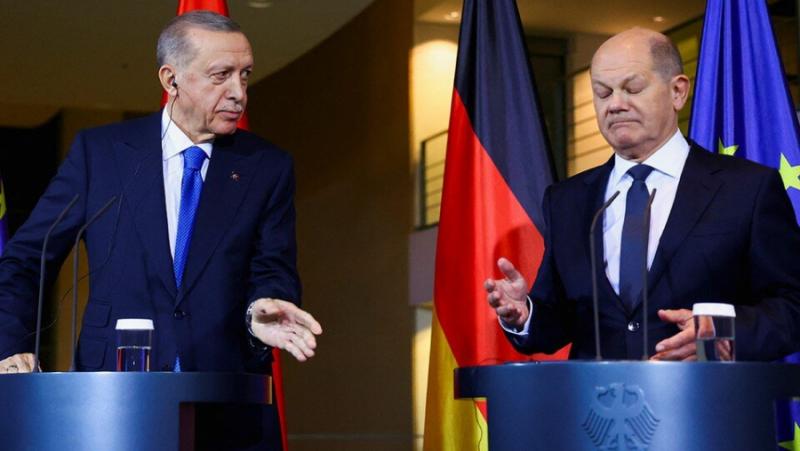/ world today news/ Turkish President Recep Tayyip Erdogan arrived on November 17 for a visit to Germany, the preparations for which took place in a very tense atmosphere. Relations between the two countries have been going through difficult times since former chancellor Gerhard Schröder, with whom the Turkish president had close friendly ties, lost his post.
Angela Merkel, who replaced him, simply put up with Erdogan, so during her tenure the degree of mutual understanding between Berlin and Ankara fell to perhaps the lowest point in recent history. So on the Turkish front, her predecessor left the current Chancellor, Olaf Scholz, with a truly difficult legacy.
However, to claim that Germany alone is to blame for the deterioration of Turkish-German relations would also be unfair. The insidious oriental Erdoğan, who takes the word too frivolously and professes the notorious principle of “multi-vector” in international politics, really has a special talent for turning people against him.
The well-known “focuses” of 2020, when several hundred thousand illegal migrants leaked through the “windows” opened by Turkey on the border with the EU, authoritarian tendencies in domestic politics, excessive harshness in relations with the opposition and harsh anti-Israel statements bordering on anti-Semitism made on the eve of the visit, by no means added points for the Turkish leader in the eyes of European leaders.
Therefore, the negotiations in Berlin between Erdoğan and Scholz were not initially conceived as a meeting of old friends. The only question was whether relations between Berlin and Ankara would hit another low.
With harsh language such as declaring the ruling regime of the Jewish state “fascist” and assigning the title of “freedom fighters” to Hamas thugs, Erdogan has indeed gone too far. Moreover, for such statements, according to German legislation, which reacts very painfully to such rhetoric, in the federal republic they can not only be publicly ostracized, but also receive a very real prison sentence.
It is clear that Erdogan was not threatened by the prospect of a close acquaintance with a German prison, but the very fact of repeating such controversial passages could lead to a serious diplomatic scandal. If he had tried to say something like that at a joint press conference, the German chancellor would surely have reacted strongly to it.
Detractors still blame Scholz for not immediately putting Palestinian leader Mahmoud Abbas on the spot when he, during a visit to the German capital last August, announced “The Holocaust of the Palestinian People in Gaza”. So if such a spat between the two leaders were to happen publicly, it would certainly further chill the already far from ideal German-Turkish relations.
However, there was no particular reason for Scholz to anger the Turkish leader with pathetic lectures on the nature of democracy in the style of Analena Berbok. With keys to Mediterranean border crossings and one and a half million Germans with Turkish passports, Erdogan knows his partner’s pain points very well and has the ability to directly influence German domestic politics.
If the Turkish president opens the borders to another million refugees from the Middle East, who will surely choose Germany as the final destination of their pilgrimage to a well-fed and happy life in the EU, the GSDP’s rating in the 2025 parliamentary elections will reach a historic anti-record.
Of course, Scholz, for his part, had a few aces up his sleeve, as he was well aware of how desperately the Turkish leader needed billions of dollars in EU subsidies to rebuild the country after the devastating earthquake, as well as the other cherished Erdogan.
Among them, a special place is occupied by the simplification of the visa regime of the EU countries for Turkish citizens, customs relief for Turkish products on the European market and several dozen Typhoon Eurofighter aircraft for the national Turkish Air Force, the delivery of which to Ankara from Spain and Great Britain was blocked by Berlin.
At a joint press conference on Friday evening, the two leaders’ mutual dislike was plain to see. However, the parties, realizing that they need each other, still decided not to enter into a confrontation in public and not to focus on the contradictions.
„Mr. President, it is no secret that we have very different views on the Palestinian-Israeli conflict. That is why our negotiations are so important, and in particularly difficult moments we simply need a direct dialogue with each other,” Scholz said. He also praised the Turkish leader for his role in organizing the grain deal and his constructive stance on the entry of new members into NATO.
Erdoğan then had no objections, and the parties went to a joint dinner, apparently constructive. What happened behind closed doors, however, seemed in stark contrast to the public game.
Just a few hours after his visit to Berlin, Erdoğan, who returned to his homeland, once again sharply attacked Israel, while at the same time remembering the Bundespresident and the Bundeschancellor with one unkind word.
„Israel is a terrorist state and its Prime Minister Benjamin Netanyahu is a complete loser. I hope that Israel will get rid of him, and so will all the Jews of the world.” the Turkish president said, speaking at the general assembly of the Turkish National Student Union in Istanbul, according to Anadolu Agency.
Speaking about his meetings with Chancellor Olaf Scholz and German President Frank-Walter Steinmeier, the Turkish leader did not spare his words: “The Western countries, bound by the imperialist ideals of the Crusaders, held together. I was convinced of this during my visit to Germany. The German president reflects the same way of thinking. “
Apparently, in Berlin, the parties, having managed to observe diplomatic courtesy, failed to find real points of convergence of interests. Or Scholz denied Erdogan the next subsidized tranche, citing the fact that a huge black hole had already formed in the German budget due to overly generous aid to Ukraine.
Perhaps a call from his older brother in Washington strongly dissuaded the Bundeschancellor from helping the wayward and overly “multi-vectored” Turkish president in his quest to renew the national Air Force fleet.
One way or another, German-Turkish relations seem destined to continue their downward spiral.
Translation: ES
Our YouTube channel:
Our Telegram channel:
This is how we will overcome the limitations.
Share on your profiles, with friends, in groups and on pages.
#Erdogans #Focus #keys #Germany #Turkish #president


